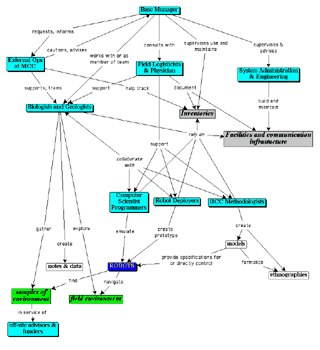HMP-99 Science Field Report
Human Centered Computing
by Dr. Bill Clancey and Maarten Sierhuis, NASA/Ames Research Center
The Human-Centered Computing (HCC) group at NASA/Ames Computational Sciences Division is conducting research at Haughton as members of the Haughton-Mars Project (HMP) to determine, via an analog study, how we will live and work on Mars.
HCC researchers on the HMP are studying field science so we can design technology that fits human needs and preferences:
- to determine requirements and test prototypes for infrastucture and data collection tools
- to design and automate habitat systems
- to prototype protocols and collaboration tools for mission operation support at sites beyond earth orbit
- to establish needs and methods for virtual presence (for the public, scientific communities, and immediate collaborators of the crew), including remote sensing
Specific HCC experiments underway at HMP-99 include:
Mission Operations & Monitoring -- This is a two-week collaboration with the HMP, Steve Hoffman (JSC Expoloration Office, at Haughton July 13-23) and JSC's Mission Operations Directorate (MOD). This study includes exchanging information between Haughton and a Mission Control Center backroom by the use of documents and video. How is supporting scientists in the field different from MCC's Shuttle and Station experience? Other HCC researchers from Ames Research Center (John O'Neill and Roxana Wales) are stationed at JSC during this period, observing MCC's interactions with Haughton and serving as facilitators. A subproject involves preparing training materials about camp safety, through a collaboration between people in the field and MOD.
HMP/Carnegie Mellon University (CMU) Field Robotics Experiments -- HCC is collaborating with researchers on the HMP/CMU field robotics research program at Haughton to specify opportunities for robots assisting scientists. Maarten Sierhuis has carried out a parallel investigation that documents work during traverses, from which he will build a simulation model, using a tool that represents people, their tools, and their work environment, that will serve as a partial controller for a robot that accompanies scientists in the field. (See the accompanying information about work practice simulation.)
Crew Handover Tools -- HCC is determining needs for communication between phases and tools for learning from past experience, as well as continuing research in various venues. Such handovers will occur on the Space Station, as well as on sequential missions to Mars. People on subsequent phases may have only a few hours together, or not see each other at all. During the HMP we are experimenting with knowledge representation tools to represent field activities and research concepts, using photographs and documents to provide details. Such a tool could accumulate records, serving as an expedition memory that will be carried over from year to year, with more structured information than a conventional web site provides.
Information Technology Infrastructure -- HCC is developing a comprehensive remote computing system, which uses wireless networks to link computers with recording instruments. Part of this research on the HMP, involves understanding how scientists currently use computers. For example, how can we develop a robot assistant for someone who is not yet comfortable using word processors or databases for recording data? At Haughton, the most intent users of computer tools to organize and abstract their observations are computer scientists, not geologists. Related to this, we are investigating what software people brought from home and how they are learning to use and adapt it in the field.
Ethnography of Human Exploration of Space -- We are carrying out an ethnographic study of scientific field work (fewer than a handful of related studies are known), covering all aspects of a scientist's life in the field. This study involves observing as participants at Haughton and writing about our experiences. We then look for patterns in how people organize their time, space, and objects and how they relate to each other to accomplish their goals. In this study, we are focusing on learning and conceptual change. Surprisingly, we find that learning in the field mostly concerns how to use or adapt tools. Problem solving involves gathering data using misbehaving, lost, or missing tools. Conceptual change involves how to think about tools in new ways, rather than changing domain theories about the crater's geology or biology (though of course this sometimes happens). For example, a biologist must gather data about UV light in a lake, despite software problems that prevent automatic logging.
Work Practice Modeling and Simulation -- A central aspect of Human-Centered Computing research is understanding how people actually do their work so we can develop tools that make work safer, more efficient, or of higher quality. We do this by formally describing--in computer models--how people work. We call this a model of work practice. At a field expedition such as in Haughton Crater, work is integrated with life. Our developing model of the Haughton-Mars expedition therefore includes:
- groups or communities of people living and working together (geologists, biologists, computer scientists, physicians, etc.)
- activities they do at different times and places (e.g., when and where they plan their work, how they review their progress)
- collaboration (e.g., helping each other use tools)
- communication (e.g., informal breakfast meetings that occur simply because two people happen to wake up at the same time)
- objects (e.g., documents such as instruction manuals or data reports) and tools (e.g., recording instruments) -
- geography and spatial layout of places where people live and work (e.g., the layout of tents in the base camp, the layout of laptops in a work tent, lakes sampled by biologists, significant rock outcroppings examined by geologists)
- social knowledge (e.g., knowing who is an expert in a particular area and knowing how to interact with people, such as whether people let you borrow their tools).
A model of how people work at Haughton Crater will be useful for planning and designing the Mars Arctic Research Station. For example, we observe that people visit their personal tents most intensively as they are preparing for an EVA; this suggests that "traffic patterns" in the habitat should allow for easy access between storage of various kinds and the EVA setup area. A second use for a simulation model is to control the behavior of EVA robots that can collaborate with each other and the crew. As an example of this approach, Maarten Sierhuis is developing a work practice simulation of the Apollo 12 ALSEP Offload activity, which resembles some of the work in deploying scientific instruments at Haughton.
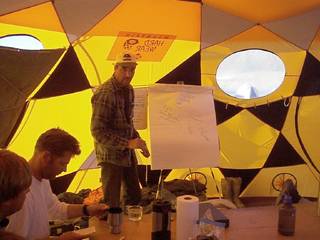
|
Bill treats the HMP Team to a lecture on HCC. |
|
Schematic of team interaction at Devon. |
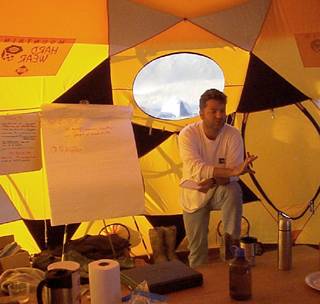
| Maarten discusses his part of the HCC study. |
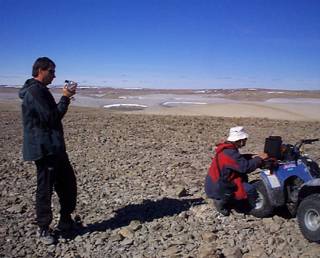
| Bill watches Rick uses one of the mobile laptop systems. |
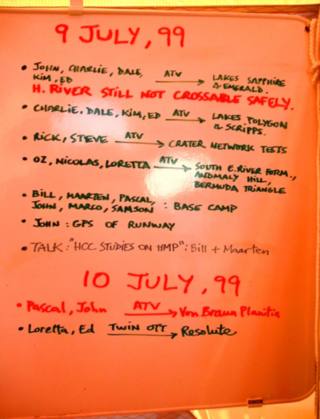
| An example of mission planning. |

| Bill observes Loretta take measurements of a biologic oasis. |
Back to William J. Clancey Home Page
Photos by David Reyes, Bill Clancey and Samson Ootoovak.
